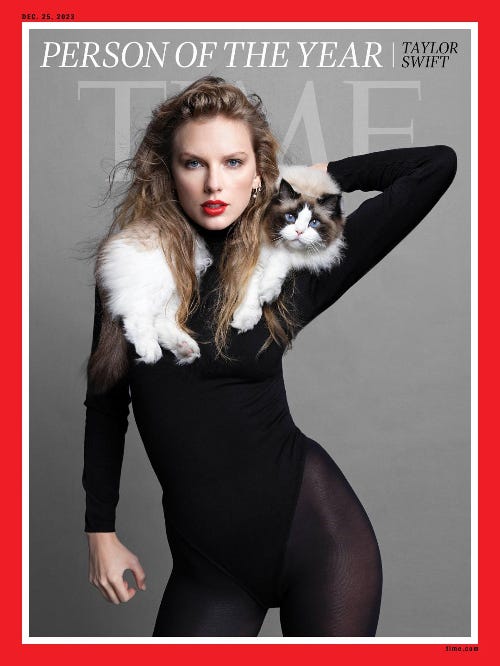Hello to everyone who’s arrived here from Helen Lewis’s Bluestocking! Tox Report is a weekly bulletin of what I’ve been listening to, watching and reading plus miscellaneous links and occasional essays — I hope you enjoy it. This week: the objective best song of 2023, Ridley Scott feasts on the bones of history and the ongoing triumph of Ms T Swift, plus a frankly out of control links section.
I was really thrilled to see TOXIC the book make an appearance on Steven Poole’s best ideas books list for the Guardian, where he called it: “furious and funny… Ditum always has something new and insightful to say about old scandals, and how they continue to reverberate in many current conversations.” Personally I’d buy anything Steven recommended so you know what to do. (And if you’d like a signed bookplate for your copy, reply to this newsletter with your address and preferred dedication, and I’ll post one out to you.)
Listened
Killer Mike, “Don’t Let the Devil”
It’s Spotify Wrapped time! (Quickly followed by Spotify bins off its staff time. I wonder how long before the Great Streaming Reckoning that’s currently hitting TV begins to be felt in the way we listen to music.) That means that I can say definitively that my favourite song of 2023 was this one — the lead single from Killer Mike’s great, great Michael album. It’s a collab with El-P, Killer Mike’s partner in Run the Jewels, and works as a kind of transitional object between their more straight-up rap music and the churchgoing sound of Michael, built around an urgent and mournful sample of “It’s So Hard to Break a Habit” by the Webs. I wrote a bit about why Killer Mike is the most interesting man in hip-hop for the Critic earlier this year.
Watched
Napoleon (in theatres)
There are some times when I think Ridley Scott is just taking the piss (House of Gucci, which I hope I live to see embraced as the camp classic it is). There are times when I think he might just be rubbish (Robin Hood). And there are times when he is undoubtedly a genius (Alien, Blade Runner, Gladiator). Napoleon is the ultimate Ridley Scott movie because it’s all three.
The battle scenes are extraordinary and brutal: in the first fifteen minutes the front quarter of a horse gets blown up and it’s both thrilling and horrifying, while the icy doom Napoleon lures the enemy to at Austerlitz is cruelly beautiful, even if exaggerated. Napoleon blowing up the pyramids is stupid, but it’s hard not to love a director whose response to charges of historical inaccuracy is: “Excuse me, mate, were you there? No? Well, shut the fuck up then.”
Then there’s all the rest of it. Joaquin Phoenix is so wrong as Napoleon it’s like a joke, playing him as a petty manchild even though he looks at least twenty years too old for the role: if you want a rough idea of the characterisation, imagine Jordan Peterson with slightly less stupid taste in clothes. The script gives him no grit. Nothing ever stands in his way — it’s just a procession of scenes in whatever Napoleon wants is delivered into his lap, and even when he ends up freezing and starving in Russia, the adversity is self-created.
And the sex stuff is… well. Josephine flashes her cat (Vanessa Kirby’s regal bearing would be just right if Scott had cast a Napoleon who was five years younger than her rather than 15 years older), Napoleon grunts and stamps like a frisky bull, and then they fall out and he waves a piece of meat at her crowing: “Destiny has brought me this lambchop!” What a line. Phoenix must be the most humourless man alive to have got through all this without corpsing.
 Tiktok failed to load.
Tiktok failed to load.Enable 3rd party cookies or use another browser
Read
Sam Lansky, “2023 Person of the Year: Taylor Swift” (Time)
A few weeks ago I was blithely declaring that Taylor Swift doesn’t do interviews. Correction: Taylor Swift doesn’t do interviews unless you’re anointing her Time person of the year. I’m madly curious about the copy approval process here — presumably Taylor doesn’t engage with the press unless she’s set the terms, but then again perhaps she’s operating at a galaxy brain level where she never needs to say explicitly what is or isn’t acceptable from her journalistic mediators.
Interviewer Sam Lansky (one of the ghostwriters who worked on Britney’s autobiography) does a great job of finding revelations in a set of quotes that could easily tell the reader nothing new. (Less artful writers will try to overcome a cagy interview by scraping significance out of every physical gesture, and it reads desperate. Trust me, I've been there.) The brilliance in this profile is the moment Lansky realises he’s been rolled by the Taylor narrative machine, because while it subverts what's gone before, it also delivers an insight that bolsters rather than undermines Taylor’s persona:
Here, Swift has told me a story about redemption, about rising and falling only to rise again—a hero’s journey. I do not say to her, in our conversation, that it did not always look that way from the outside—that, for example, when Reputation’s lead single “Look What You Made Me Do” reached No. 1 on the charts, or when the album sold 1.3 million albums in the first week, second only to 1989, she did not look like someone whose career had died. She looked like a superstar who was mining her personal experience as successfully as ever. I am tempted to say this.
But then I think, Who am I to challenge it, if that’s how she felt?
I like this way of understanding Taylor — as the arch-artist of our self-determined age — because it’s the way I understand her too. This is an era when the greatest power is the power to tell your own story, to author your own brand, and she is a supreme storyteller. Style note: it’s extremely deft of Lansky to contradict the Taylor historical record while positioning himself as inferior to the act of contradicting her. Well played.
Gimme, gimme more…
From me in the Sunday Times: the week’s TV (source for the Sheffield swingers anecdote here) and why you should read Poor Things (Gray tattoo here).
“A diasporic artist — a diasporic anyone, in truth — can make a choice about what their culture is, what parts they choose to play with, what they choose to discard, what they choose to distort.” Padraig Reidy on Shane MacGowan.
FFS Nigel Farage came third on I’m a Celebrity, rip my prediction of midtable ignominy. I’ve normally got a better instinct for who the public will click with so I guess that’s one to put down to either my own wishful thinking, or my failure to reckon with his ability to mobilise his own fanbase outside of the ITV audience.
I’m amazed that the English press didn’t make more of the ruling on section 35, in which the Court of Session ruled Westminster was right to block the SNP’s Gender Recognition Reform Act — this feels to me like a big constitutional moment, aside from the implications on gender. OTOH it falls in the gap of two big chauvinisms, given it’s about something that principally affects neither Westminster not men. Euan McColm on the ruling.
I watched Northern Ballet’s delightful Nutcracker with my goddaughter, her sisters and their godmothers last week. The show closed on 10 December, but you can check out the company’s coming shows here. The Mouse King: hilarious.
Last week’s digression on Jude-formerly-Sady Doyle inspired a reader to send a link to a 2009 Doyle post about the seductions of rage. “You always have to consider the possibility that you’re the bad guy – that you can be a bad guy regardless of your cause. You have to constantly look at your enemies, not to see how you are different, but to see how you are the same.” And then I guess 14 years later, you devote your entire newsletter to abusing your ideological enemies. But we can be assured that Doyle has thought really really hard about it.
There’s something about that line of thinking which I think connects to the New Atheists — the idea that you are engaging in a brave form of moral self-scrutiny that separates you from your foes. It’s the hubris of Richard Dawkins celebrating the existential bravery of the atheist, or this old atheist blogosphere post skirting the notion that unbelief entails singular freedom from the rationalisations offered by religion. The New Atheists were one of the noughties phenomena that ended up absent from Toxic, but I have a feeling they have a significant part to play in my next big project.
I disagree with this statement so strongly and I find that fascinating: “birthing a baby is a direct challenge to the belief that you are your body. I mean, your body just created another body equipped with a separate consciousness that you can’t access. (Whoa.)” Maternity can be traumatic in a physically alienating way, but labour made it animalistically obvious to me that I am my body — an insight of physical extremity that I’ve also had from exercising hard and being life-threateningly ill. Also why would nurturing a separate body with a separate consciousness make you feel less of an embodied creature? There’s a fundamental error here about the relationship between bodies and selves, and I want to scratch at it.
The only good thing left about Twitter? This guy’s dedication to compiling all the most terrible tweets. It’s a strong field this year: I voted against “is it OK to eat mentally subnormal children?”







Re. the New Atheists: yes, gravitational attraction brought them together into a self-congratulatory cult, but... I still find it a bit perplexing that those of us who don't ascribe our existence to one of a selection of random unfalsifiable beings (assigned for random cultural reasons) are clumped under the grouping "non-believers". As though we're the problem - silly old us for not believing in things that are designed to be unprovable. I'd guess most of us believe in lots of other stuff (gravity, evolution, etc), just not God. It would seem more rational for the "non-atheists" to be lumped together, but that just me being silly again.